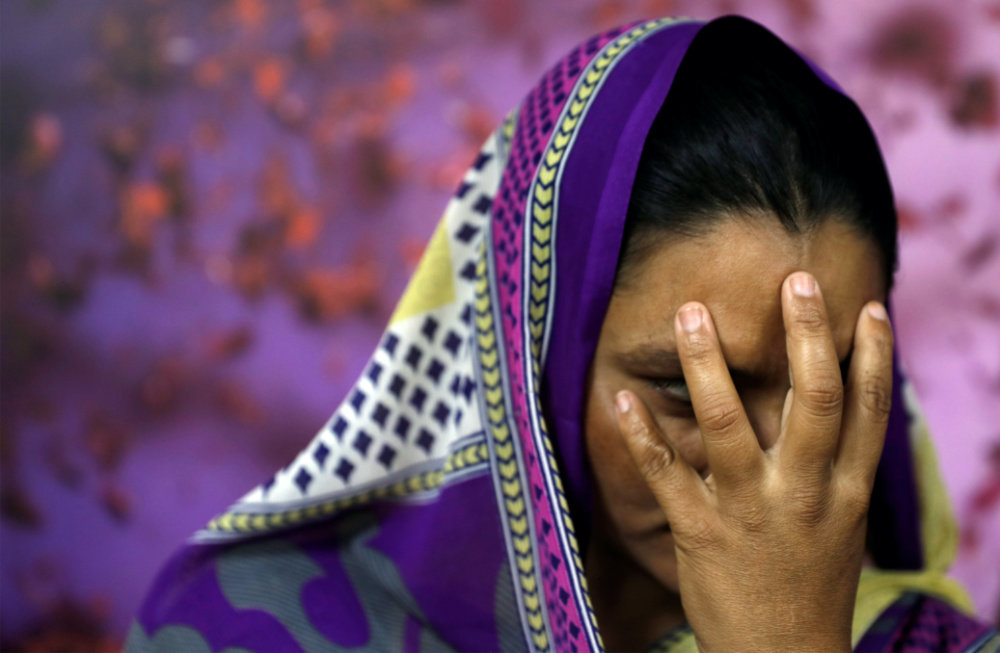London, UK
Thomson Reuters Foundation
With less than a decade for the world to meet a United Nations target of ending modern slavery, experts say gains in tackling human trafficking risk being undone by the COVID-19 pandemic.
About 40 million people globally are estimated to be enslaved – in forced labour and forced marriages – in a trade worth an estimated $US150 billion a year to human traffickers, according to the UN International Labour Organization.

Theresa Kerketa, 45-years-old, poses for a picture at her residence on the outskirts of New Delhi, on 2nd November, 2012. Kerketa was rescued by a charity which rescues victims of bonded labour. PICTURE: Reuters/Mansi Thapliyal/File photo.
Ending modern slavery by 2030 was one of the 17 Sustainable Development Goals (SDGs) adopted by the United Nations in 2015.
But the fallout from coronavirus – from lockdowns and business closures to shut borders – could drive more people into forced labour or sexual exploitation, and mean victims are less likely to be rescued or receive support, according to advocates.
From investing in survivor leadership to protecting labour rights, here are three priorities for the global anti-slavery movement in 2021 as told to the Thomson Reuters Foundation by various leading academics, activists, officials and experts:
Survivor leadership
While survivors of modern slavery are often relied upon to share their stories and support other victims, they are rarely given the chance to influence or lead anti-trafficking efforts.
However an initiative launched in 2020 by the Freedom Fund – a private donor fund – is training female survivors in India to be campaigners and leaders in the anti-slavery movement. The project will also be rolled out in Nepal, Thailand and Ethiopia.
“[This] will equip and connect a new generation of frontline women and survivor leaders to drive a stronger, more diverse and representative movement to end slavery and trafficking,” said Nick Grono, chief executive of the Freedom Fund.
Minh Dang, head of the Survivor Alliance – a platform that provides contacts and opportunities – said survivors were well placed to help meet the basic needs of other victims who had been left jobless or fallen into poverty due to the pandemic.
“Having a strong survivor leadership in the field will contribute to establishing interventions that support people into sustainable futures,” she said, adding there was “still a misunderstanding” about meaningful survivor engagement.
Support for victims
With attention and resources diverted elsewhere during COVID-19, trafficking is now even more underground and less visible, the UN special rapporteur on trafficking has warned.
Many victims are unable or afraid to speak out or seek help – with migrant workers particularly vulnerable – and face working longer for less pay or falling further into debt bondage due to the economic slowdown, according to several experts.
Governments need to urgently revive their anti-trafficking responses to head off a “ballooning crisis”, said Valiant Richey, trafficking lead at the Organization for Security and Co-operation in Europe, a security and rights watchdog.
“This means reactivating the criminal justice and victim assistance systems, including by adequately funding NGOs, as soon as possible,” he said.
Unconnected to coronavirus, campaigners have voiced concern in major nations from Britain to the United States about the low number of victims granted asylum or leave to remain.
Britain’s independent anti-slavery commissioner, Sara Thornton, said there was a moral argument and also a practical one for granting leave to survivors, as many otherwise faced being stuck in safehouses or left destitute on the street.
“Surely 2021 is the year to resolve this?” she said.
Protecting labour rights
Activists and academics have warned of a rollback of labour rights in global supply chains as companies force workers to accept worse conditions and governments used the economic fallout from COVID-19 to justify weakening labour legislation.
Violations of labour rights hit a seven-year high in 2020 as more governments prevented workers from forming unions or collectively bargaining, found the Global Rights Index by the International Trade Union Confederation..
Several states in India, for example, have suspended laws on the length of the working day, minimum wage, and ability to unionise, while Brazil passed measures in March that deny millions of workers the right to collective bargaining.
“Governments must resist temptations to relax labour protections as economies reopen, instead…ensuring that laws seeking to prevent exploitation are enforced,” said David Westlake, chief executive of International Justice Mission UK.
The private sector is also facing increasing pressure from campaigners and consumers to improve conditions for workers in their supply chains and ensure they are slavery-free.
One spotlight in 2020 was on the sourcing of cotton and clothing by brands from China’s Xinjiang region, where ethnic Uighurs and other Muslims are said to be held in detention centres and forced to work. Beijing has denied any mistreatment.
“[Businesses must] acknowledge global supply chains across many sectors are tainted by modern slavery…and ensure they are not unwittingly contributing to exploitation,” said Patrick Proctor, head of programs at global charity Hope for Justice.





